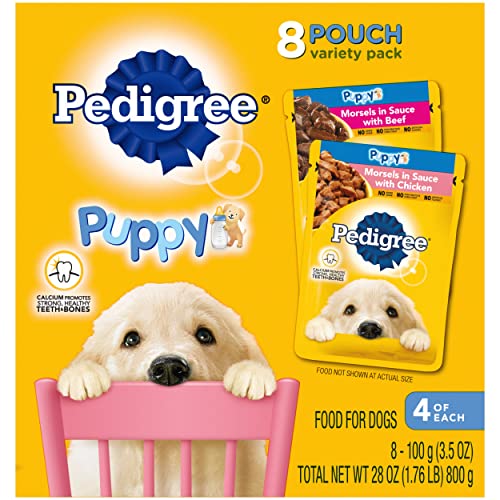To guarantee your puppy's growing right, they need a balanced diet tailored for their unique nutritional needs. Aim for high-quality puppy food containing 22-32% protein and 10-25% fat, along with essential vitamins and minerals. Feed your pup 3-4 meals daily, using portion control to prevent overeating. Consider dry, wet, or combination diets for variety and nutrition. Be cautious about shifting to adult food too soon; consult your veterinarian for guidance. By understanding their dietary requirements and feeding habits, you'll set your puppy up for a healthy life. Explore more tips to keep your furry friend thriving!
Key Takeaways
- Ensure your puppy's food meets AAFCO standards and is specifically formulated for growth with adequate protein and fat content.
- Feed young puppies 3-4 times daily, following portion guidelines based on age and expected adult weight to prevent overeating.
- Monitor your puppy's growth rate and adjust their diet as needed to support healthy skeletal development and overall health.
- Gradually introduce new food types to avoid digestive upset and provide a balanced diet, including dry, wet, or combination options.
- Consult your veterinarian for personalized feeding plans and regular check-ins to ensure your puppy's nutritional needs are being met.

Purina ONE Plus Healthy Puppy Formula High Protein Natural Dry Puppy Food with added vitamins, minerals and nutrients – 8 lb. Bag
Real chicken is the first ingredient in this dog food for puppies to help provide the protein he…
As an affiliate, we earn on qualifying purchases.
As an affiliate, we earn on qualifying purchases.
Nutritional Requirements for Puppies

When it comes to your puppy's growth and development, understanding their nutritional requirements is fundamental. Puppies need a balanced diet specifically formulated for their growth phase, which includes high-quality puppy food from trusted brands.
These brands typically employ qualified animal nutritionists to guarantee their formulas meet your puppy's needs.
To support healthy growth, focus on their protein needs, which range from 22-32% on a dry matter basis, while fat content should be between 10-25% to maintain energy levels and promote skin health.
Essential nutrients, including carbohydrates, vitamins, and minerals, are critical for bone growth, immune function, and overall health during this rapid growth phase.
Make certain the puppy food you choose meets specific AAFCO standards and has undergone feeding trials to confirm it supports healthy growth and prevents future health issues.
Additionally, always provide fresh, clean water to your puppy, as proper hydration is essential for their overall health and bodily functions.

Pedigree Puppy Soft Wet Dog Food 8-Count Variety Pack, 3.5 Oz Pouches, 8 Count (Pack of 1)
100% COMPLETE AND BALANCED nutritious soft wet food for puppies with DHA to help support brain development and…
As an affiliate, we earn on qualifying purchases.
As an affiliate, we earn on qualifying purchases.
Feeding Amounts for Optimal Growth

Understanding how much to feed your puppy is just as important as knowing their nutritional requirements. To guarantee ideal growth and development, follow feeding guides based on your puppy's age and expected adult weight.
Young puppies typically need 3-4 meals daily, with portion sizes tailored to their weight, activity level, and body condition. Regular vet check-ins are vital for monitoring your puppy's appetite and growth patterns. This helps confirm that your puppy receives the right amount of food for healthy development.
Remember, portion control is fundamental to prevent overfeeding; excess calories can lead to obesity and health issues later in life. When determining the right feeding amount, it's important to take treats into account as well.
Treats should account for no more than 10% of your puppy's total daily caloric intake to maintain a balanced diet and avoid unwanted weight gain. By staying attentive to your puppy's nutritional needs and adjusting the feeding amounts accordingly, you can help guarantee they grow into a healthy adult dog.

SOUJOY 2 Pack Stainless Steel Puppy Bowls, Pet Slow Feeder Bowls, Non-Skid Dog Food and Water Bowl, Feeding Weaning for Small Medium Large Dogs, Cat, Pets, Multiple Puppies
Ideal Size for Puppy: Puppy Bowl measured 10 inches diameter, 1.3 inch height. 2 pack bowls are enough…
As an affiliate, we earn on qualifying purchases.
As an affiliate, we earn on qualifying purchases.
Types of Puppy Food Options

When it comes to choosing puppy food, you have several options: dry, wet, or a combination of both.
Each type has its benefits, whether it's the convenience of dry food, the palatability of wet food, or the balanced approach of a mixed diet.
Understanding these options will help you select the best food for your puppy's growth and development.
Dry Food Benefits
Choosing dry puppy food can offer several advantages that make it a practical option for busy pet owners. One major benefit is its higher nutritional density, which means you can provide essential nutrients in smaller portions. This is essential for your puppy's diet as it helps maintain a healthy weight during those critical growth stages.
The crunchy texture of dry food not only encourages chewing but also promotes dental health by reducing plaque and tartar buildup. Plus, if you have a younger puppy, you can soak the dry food in warm water to make it easier for them to chew and digest. This versatility supports their puppy growth at various developmental stages.
Consistency in feeding dry food plays an important role in your puppy's digestive health, as it promotes regular bowel movements and minimizes the risk of gastrointestinal upset.
Wet Food Advantages
For many puppy owners, wet food presents a delicious option that can make mealtime more enjoyable for their furry friends. Wet food is particularly appealing for puppies, especially those moving away from nursing or facing dental challenges. Its soft texture makes it easier for young pups to chew and digest.
One of the significant advantages of wet food is its high moisture content, which aids in hydration. This is vital for promoting urinary health and overall well-being in puppies.
Many high-quality wet foods are specifically formulated to support growth and meet the unique nutritional needs of developing puppies. These options guarantee your pup receives a balanced diet that fosters healthy development.
Additionally, wet food can enhance the flavor of meals, encouraging picky eaters to enjoy their food. When mixed with dry food, it creates a delightful combination that promotes better overall nutrition.
Overall, incorporating wet food into your puppy's diet can provide essential hydration, a palatable eating experience, and the necessary nutrients for superior growth and development.
Combination Diets Explained
Understanding combination diets can greatly enhance your puppy's nutrition. These diets typically include dry puppy food, wet food, or a mix of both, all formulated to meet your puppy's nutritional needs for healthy development. A combination diet can support growth while promoting digestive health.
When considering puppy food options, it's important to introduce them gradually to prevent digestive upset. You might soak dry puppy food in warm water to assist younger puppies with chewing and digestion, making it easier for them to consume.
Here's a quick overview of the types of puppy food:
| Type of Food | Benefits | Considerations |
|---|---|---|
| Dry Puppy Food | Promotes dental health | May require soaking for younger pups |
| Wet Food | High moisture content | Can be more expensive |
| Combination Diets | Balanced nutrition and variety | guarantee gradual introduction |
Maintaining consistency in the food you offer helps reduce the likelihood of gastrointestinal issues. Always prioritize nutritional balance to support your puppy's overall growth and development.

Efficient Nutrition Portion Control Containers DELUXE Kit (14-Piece) with COMPLETE GUIDE + 21 DAY PLANNER + RECIPE eBOOK BPA FREE Color Coded Meal Prep System for Diet and Weight Loss
✔️Downloadable resources!
As an affiliate, we earn on qualifying purchases.
As an affiliate, we earn on qualifying purchases.
Feeding Schedules vs. Free Feeding

When it comes to feeding your puppy, setting a schedule can be more beneficial than free feeding.
Scheduled meals help control portion sizes and prevent overeating, which is vital for your pup's growth and health.
On the other hand, free feeding can lead to weight issues, especially in larger breeds, making a structured approach essential.
Scheduled Feeding Benefits
Establishing a feeding schedule for your puppy can greatly enhance their overall health and well-being. Scheduled feeding promotes healthy eating habits and helps prevent overeating, which is vital for their development. Dividing daily food into 2-3 small meals allows for better digestion and energy distribution throughout the day, supporting their rapid growth.
Here's a quick overview of the benefits of scheduled feeding:
| Benefit | Description | Impact on Puppies |
|---|---|---|
| Portion Control | Helps regulate how much your puppy eats per meal | Prevents overeating |
| Consistent Feeding | Creates a routine around meal times | Reduces picky eating habits |
| Smaller Meals | Supports digestion and energy levels | Enhances overall health |
Feeding puppies aged 6-12 weeks 4 times a day guarantees they receive the necessary nutrients for their growth. By sticking to a consistent feeding schedule, you not only foster healthy eating habits but also make mealtime a predictable and enjoyable experience for your puppy. Additionally, incorporating safe fruits for dogs like apples and blueberries can provide essential vitamins and minerals to support their development.
Risks of Free Feeding
Free feeding might seem convenient, but it can lead to serious issues for your puppy. When you allow your pup to graze on food throughout the day, it's tough to monitor their calorie intake. This lack of portion control can result in overeating and significant weight issues, especially in large breed puppies, who are prone to obesity and skeletal abnormalities.
Consider the following risks of free feeding:
- Overeating: Puppies may consume more than their bodies need.
- Weight Issues: Unmonitored food intake can lead to obesity.
- Poor Body Condition: It's harder to assess if your puppy is growing properly.
- Lack of Routine: Free feeding disrupts a consistent feeding schedule.
- Digestive Problems: Scheduled feeding aids digestion and promotes healthy eating habits.
Switching to a scheduled feeding approach helps you manage calories effectively. By splitting their daily food into 2-3 meals, you can better monitor their intake and adjust portions according to their growth and body condition.
This routine not only supports your puppy's health but also provides the mental stimulation essential for their development.
Transitioning to Adult Food

As your puppy approaches adulthood, it's time to contemplate shifting to adult food to support their ongoing growth and health.
Shifting to adult food typically occurs between 10 to 14 months of age, but this can vary based on your puppy's size and breed. For large-breed puppies, this shift may take longer, extending up to 24 months to guarantee their nutritional needs are fully met.
It's essential not to switch to adult dog food before 12 months for small and medium breeds, as they still require the specific nutrients found in puppy formulas to support their individual growth.
To determine the best timing and food type for your puppy, consult your veterinarian, who can develop a personalized plan based on your puppy's growth rate and health conditions.
When you do shift, aim for a gradual approach over 7 to 10 days. This means slowly mixing increasing amounts of adult food with decreasing amounts of puppy food to prevent digestive upset.
Common Nutritional Myths and Misconceptions

Understanding your puppy's nutritional needs doesn't just stop at choosing the right food during their growth phase.
You might encounter common nutritional myths that can mislead you.
Let's debunk some misconceptions to guarantee your puppy gets the healthy growth they deserve.
- All human food is safe for puppies: Some foods, like chocolate and grapes, are toxic.
- Grain-free diets are better: Grains can provide essential nutrients, and a grain-free diet isn't automatically superior.
- Puppies can eat adult dog food: They need specially formulated puppy food to meet their unique nutritional needs.
- Supplements are always necessary: A balanced diet usually covers all essential nutrients, making extras unnecessary.
- Overfeeding helps puppies grow faster: In reality, overfeeding can lead to obesity and health issues. Portion control is essential.
Frequently Asked Questions
What Can I Feed My Puppy for Growth?
You can feed your puppy a high-quality puppy food that contains at least 22-32% protein and 10-25% fat.
Look for options that have passed AAFCO feeding trials to guarantee they're nutritionally sound.
It's best to divide their daily intake into 3-4 meals if they're under six months old.
Don't forget to provide fresh water at all times, as hydration plays an essential role in their growth and overall health.
What Is the 80/20 Rule for Dog Food?
The 80/20 rule for dog food suggests that you should feed your dog a diet where 80% comes from high-quality, balanced dog food, while the remaining 20% can be treats or human food.
This approach guarantees your pup gets essential nutrients while allowing some variety.
Just make certain the 20% portion is healthy and doesn't lead to excessive calories.
Always consult your vet to tailor portions to your dog's specific needs.
How to Get Your Puppy to Grow Bigger?
You want your puppy to grow big and strong, but it's not just about size; it's about health.
Start by providing a high-quality puppy food rich in protein and fat. Feed them multiple meals each day, adjusting portions based on their activity level and growth patterns.
Regular weigh-ins help you track their progress, while treats should stay limited.
Consult your vet for tailored advice to guarantee your puppy thrives as they grow.
What Can I Feed My Puppy to Make It Bigger?
To help your puppy grow bigger, you should feed it high-quality puppy food rich in protein, ideally between 22-32%.
Look for options with 10-25% fat to guarantee it gets essential fatty acids and energy.
Monitor portion sizes based on your puppy's age and activity level to avoid overfeeding, which can lead to health issues.
Regular vet visits will help you adjust the diet as needed for best growth.
Conclusion
In summary, ensuring your puppy's proper nutrition is pivotal for their playful potential and prosperous growth. By prioritizing portion sizes, picking premium puppy food, and adhering to a consistent feeding schedule, you'll set the stage for a healthy, happy hound. Remember, shifting to adult food should be gradual, and dispelling dietary myths is essential. With these mindful measures, you'll nourish your pup into a vibrant and vivacious companion for years to come!










